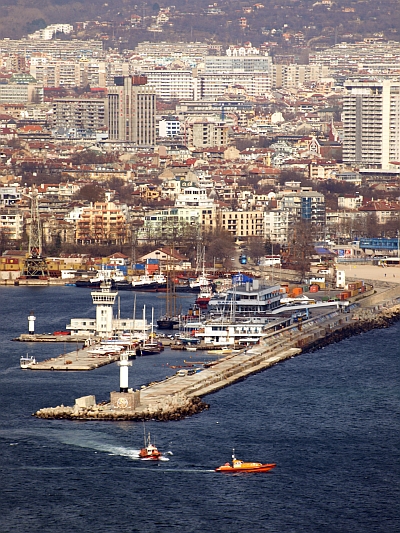Major problem areas
 Pollution, loss of biodiversity and coastal degradation have been identified as the major issues affecting the environmental state of the Black Sea. Scientists have identified several serious problems for the Black Sea associated with various types of pollution. The eutrophication phenomenon or the over-fertilization of the sea by compounds of nitrogen and phosphorus (also called nutrients), largely as a result of pollution from agricultural, domestic and industrial sources is a major transboundary pollution issue. This is a process degrading the Black Sea. Eutrophication has changed the structure of the Black Sea ecosystem. It has been estimated that the six coastal countries contribute about 70% of the total amount of nutrients flowing to the Black Sea as waste from human activities. Some of this amount and nearly all of the remaining 30% (from the countries with no direct access to the sea) enter the Black Sea through the Danube River.
Pollution, loss of biodiversity and coastal degradation have been identified as the major issues affecting the environmental state of the Black Sea. Scientists have identified several serious problems for the Black Sea associated with various types of pollution. The eutrophication phenomenon or the over-fertilization of the sea by compounds of nitrogen and phosphorus (also called nutrients), largely as a result of pollution from agricultural, domestic and industrial sources is a major transboundary pollution issue. This is a process degrading the Black Sea. Eutrophication has changed the structure of the Black Sea ecosystem. It has been estimated that the six coastal countries contribute about 70% of the total amount of nutrients flowing to the Black Sea as waste from human activities. Some of this amount and nearly all of the remaining 30% (from the countries with no direct access to the sea) enter the Black Sea through the Danube River.
In recent years chemical pollution has been identified as the most serious transboundary problem. Oil pollution threatens the Black Sea coastal ecosystems and the levels of pollution are unacceptable in many coastal areas and river mouths. Oil enters the marine environment as a result of operational or accidental discharges from vessels, as well as through insufficiently treated wastewaters from land based sources. Other toxic substances such as pesticides and heavy metals appear mostly as ‘hot spots’ near well identified sources. Heavy metals such as cadmium, copper, chromium and lead are usually associated with waste from the heavy industry and ash remaining from burning coal for generating electricity. Pesticides enter the sea mostly through rivers and streams due to agriculture.
Another major problem is the discharge of insufficiently treated sewage waters, which results in microbiological contamination and poses a threat to public health. Radioactive substances have been introduced to the Black Sea in small quantities from nuclear power plants and in more significant amounts after the nuclear power plant disaster in Chernobyl in 1986.
An unusual form of pollution from ships is the introduction of exotic species, mostly through exchange of ballast waters or other wastewaters. Introduced by accident into the Black Sea they proliferate in the new environment for lack of natural predators that can limit their numbers. The final major type of problematic pollutants is solid waste, dumped into the sea from ships and some coastal towns. Any floating or semi-submerged waste inevitably ends on the seashore. Therefore the Black Sea beaches tend to accumulate a lot of garbage, which is unsightly and presents a risk to the health of humans and marine species.



